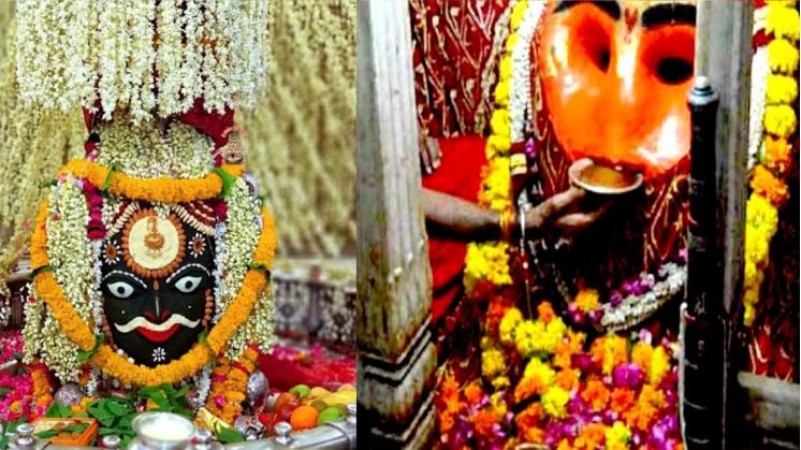
Kaal Bhairav is a significant deity in Hinduism, particularly in the Tantric tradition. He is often portrayed as a fierce manifestation of Lord Shiva and is revered as the "Lord of Time" or "Kala," representing the transient nature of life and the inevitability of death. Kaal Bhairav is depicted as having a dark complexion, adorned with serpents, wearing a garland of skulls, and holding a trident or other weapons. He is often seen riding a dog or sometimes a black buffalo. Kal Bhairav's image is often associated with a dog, which symbolizes loyalty. Like a dog remains faithful to its master, offering liquor to Kaal Bhairav is a symbol of unwavering dedication and surrender to the divine will.
One of the distinctive rituals associated with Kaal Bhairav is the offering of liquor. This practice may seem unusual and even controversial to those unfamiliar with Hindu traditions, but it has deep symbolic and spiritual significance.
Also Read: Kal Bhairav: Powerful Guardian and Protector
The offering of liquor to Kaal Bhairav is rooted in ancient Indian culture and mythology. It is essential to understand the broader context of Hindu religious practices to appreciate the reasoning behind this ritual. In Hinduism, the consumption of intoxicants is generally considered taboo as it can lead to a lack of self-control and moral behavior. However, in the context of certain deity worship and Tantric rituals, the rules and norms differ, and unique practices are observed.
Also Read: Vamana Temple: Architectural Prowess of Ancient India
There are several reasons and interpretations for offering liquor to Kal Bhairav:
Tantric tradition: Kaal Bhairav worship is closely associated with Tantra, an esoteric and ritualistic branch of Hinduism. Tantric practices often involve breaking social norms and conventions to transcend the ordinary world and attain spiritual realization. Offering liquor is considered a form of "Vamachara" or left-hand path, where unconventional means are used to achieve spiritual growth.
Subjugation of desires: Liquor symbolizes the indulgence of human desires and passions. By offering it to Kaal Bhairav, worshippers acknowledge the transitory nature of material pleasures and seek to transcend them. The act of offering represents surrendering one's desires and attachments to the deity.
Destruction of ego: In the presence of Kaal Bhairav, worshippers aim to dissolve their ego and self-identity. The intoxicating nature of liquor is believed to assist in achieving an altered state of consciousness, breaking down the barriers of the ego and connecting with the divine.
Also Read: Know the history of Jejuri Garh in Maharashtra
Liberation from limitations: Kaal Bhairav is also known as the liberator who grants moksha or liberation from the cycle of birth and death. By offering liquor, devotees seek freedom from the constraints of mundane existence and the limitations of the material world.
Purification: The liquor offered is not consumed by the deity but symbolically represents the essence of impurities and negativities within human beings. By offering it to Kaal Bhairav, devotees seek purification and spiritual cleansing.
Testing one's devotion: Kaal Bhairav is known for being fierce and unpredictable. Offering liquor can be seen as a test of one's devotion and willingness to overcome societal norms for the sake of spiritual growth.
Also Read: Duladeo Temple: Detailed Carving and Unique Architecture
The offering of liquor to Kaal Bhairav is a complex and symbolic ritual that reflects the multifaceted nature of Hindu traditions. It involves the acknowledgment of human desires, the pursuit of spiritual growth, and the surrender of ego. It should be understood in the context of Tantric practices and the specific beliefs associated with Kaal Bhairav worship.
Also Read: Telika Temple: Architectural Splendor